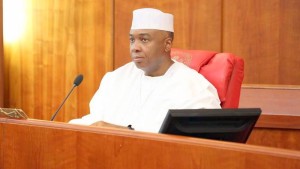Senate President Bukola Saraki said on Wednesday that the long awaited Petroleum Industry Governance Bill (PIGB) would be passed by the Senate before the end of January.
According to him, if Nigeria as a country must achieve the change, the most compelling would be the consideration of t existing petroleum legal, regulatory and institutional structures which he described as out-dated.
Declaring open a 3-day public hearing on PIGB, organized by Senate Joint committees on Petroleum (Upstream), Petroleum (Downstream) and Gas, Saraki who noted that the passage of the bill would open a new vista in the oil and gas industry, said, “Let me reassure all stakeholders of our commitment to ensure the passage of this bill. It is my hope that before the end of this session, that we will have that can be laid before us before we go on recess. And hopefully by the time we come back in January, we should be able to pass this bill.
“The petroleum industry remains the mainstay of the Nigerian economy. Oil and gas have been, and will likely remain for the foreseeable future, Nigeria’s most important non-renewable energy source. The industry contributes over 90% of the country’s foreign exchange earnings.”
The Senate President who lamented that the non-passage of the bill for almost sixteen years has negatively Nigeria as a country, said: “This all-important sector of the economy has for too long performed below efficiency indexes, with government and investors alike losing significant edge in the oil and gas investment trends. The case for change cannot be more compelling considering that existing petroleum legal, regulatory and institutional structures are out-dated.
“It is unacceptable that till date, we still import over 90% of needed petroleum products (petrol and chemicals), we flare substantial gas produced, we have damaged our eco-systems and polluted our communities and cannot supply adequate electricity to our homes and industries.
“This situation has undermined our citizens’ standard of living, life expectancy, our national energy security and has resulted to other unforeseen fall-outs like: labour unrest; fuel queues; high cost of delivery of products; high cost of delivery of overall services in the overall economy; and unquantifiable wastage of national productivity as a result.
“The state of the industry globally today, has heightened and made it imperative that either we comprehensively reform our local industry to have a chance to keep it alive or become extinct. The oil and gas industry is yearning for good governance,competitiveness, transparency, indigenous participation and accountability.”
On what the passage of the bill seeks to achieve, the Senate President said that it will “Create efficient and effective governing institutions with clear and separate roles for the petroleum industry, establish a framework for the creation of commercially oriented and profit driven petroleum entities that ensures value addition and internationalization of the petroleum industry and promote transparency in the administration of the petroleum resources of Nigeria and create a conducive business environment for petroleum industry operations.
“Let me reassure all stakeholders that this is just the beginning. We will also tackle the issues of downstream, gas and the environment. We are poised and resolved that we will deal with all issues related to the industry, albeit in tranches. This will ensure thoroughness and effectiveness. As a nation we cannot afford any further delay in our effort to reform our oil and gas industry.
“The journey begins now and I assure you that we will guarantee that all of these bills are passed in record time. I wish you all very fruitful deliberations.”
Earlier in his remarks, Chairman of the Senate Committee on Petroleum (Upstream), Senator Tayo Alaosoadura, said: “The PIB as we all know, has been lingering as it were in the corridors of the National Assembly for a little over a decade.
“However, the Eight Senate has made the PIGB as one of the key landmarks to revamp the economy and make petroleum industry more efficient. If we must get out of the present recession the country is witnessing and get the economy on the steady path of growth, the petroleum industry must be made efficient and more profit-oriented.
“The call also by the Senate president in rolling out the agenda for the 8th Senate made it abundantly clear that the passage of the PIGB will be one of the landmark successes of the Eight Senate.”
During the 3-day public hearing, critical stakeholders like the Nigerian National Petroleum Corporation (NNPC), Ministry of Petroleum Resources, PENGASSAN, NUPENA, BPE, others made presentation while other key players in the oil sector like the International Oil Companies (IOCs), Host Communities, among others are expected to make presentations.
Copyright Ships & Ports Ltd. Permission to use quotations from this article is granted subject to appropriate credit given to www.shipsandports.com.ng as the source.

